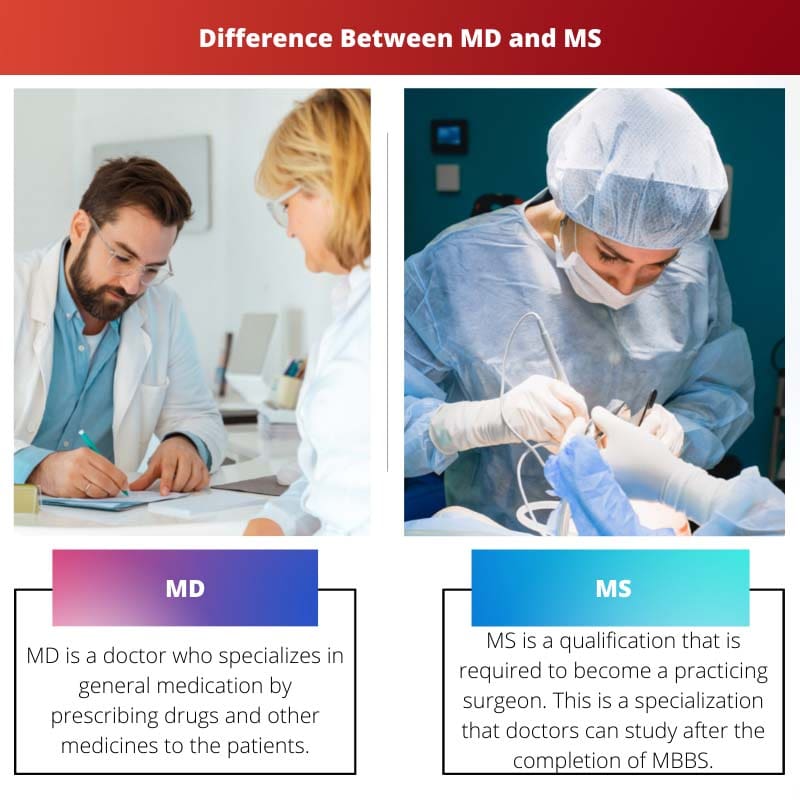Medical Science is a vast field and there are many domains that one can study.
Depending on the domain of study, some various specializations and courses teach in greater detail about one particular area of study. These specializations determine the branch of medicine that a doctor will work in.
Key Takeaways
- A Doctor of Medicine (MD) is a medical degree focused on general medicine and patient care, while a Master of Surgery (MS) is a postgraduate degree in surgical specialities.
- MD programs emphasize preventing, diagnosing, and treating illnesses, whereas MS programs concentrate on surgical techniques and patient management.
- Both degrees require a Bachelor of Medicine and Bachelor of Surgery (MBBS) as a prerequisite, and graduates of either program can pursue careers as physicians or surgeons.
MD vs MS
MD is a broad postgraduate medical degree covering theoretical and clinical aspects, with various specialities. MS is a specialized postgraduate degree focusing on surgical procedures and techniques, preparing students to perform various surgical procedures.

MD is a doctor who specializes in general medication by prescribing drugs and other medicines to patients.
As a physician, a doctor can work at a medical facility, like a hospital, or open a private clinic to treat their patients. However, a doctor with an MD qualification cannot perform surgery.
MS is a qualification that is required to become a practising surgeon. This is a specialization that doctors can study after the completion of MBBS.
This course qualifies a doctor to become a general surgeon and work in the operating theatres of hospitals. It is a highly regarded post-graduation course in medical science.
Comparison Table
| Parameters of Comparison | MD | MS |
|---|---|---|
| Definition | MD stands for Doctor of Medicine | MS stands for Master of Surgery |
| Qualification | It qualifies a doctor as a general physician | It qualifies a doctor as a general surgeon |
| Work domain | Physicians diagnose patients and prescribe the medication and drugs required | Surgeons operate on patients that require severe surgery |
| Work procedures | Doctors with MD degrees are not permitted to perform medical procedures involving higher complications | Surgeons can also refer general medications to their patients |
| Workplace | Doctors of Medicine can work either in a hospital or in a private clinic | Surgeons work in high facility medical centers |
What is MD?
MD stands for Doctor of Medicine. It is a branch of medical science that focuses more on the medicines, drugs, compounds, and other substances that are used to treat patients with different illnesses and diseases.
It is a specialization course that medical professionals study after the completion of their MBBS. Thus as the course deals with the treatment of disease using medicines, it is an allopathic course.
Allopathic doctors can further specialize in different domains after the completion of an MD. They can also work in researching and developing different medications, such as developing drugs and compounds for a specific disease.
Paediatrics, Psychiatrists, and Geriatric medications are also differently available for Allopathic doctors after the completion of MD.
Allopathic doctors can work in various places, from high-facility hospitals to private clinics to government and civilian establishments.
But irrespective of the place of work, their work is involved in diagnosing and treating patients through different medications.
Almost all the countries in the world award MD qualification after completing a specific number of course work, which could range from 2-2.5 years of postgraduate after completing an equivalent professional degree (Bachelors/Masters) in medicine.

What is MS?
MS stands for Master of Surgery. It is a medical degree and is available for medical professionals after the completion of their primary graduation course in medicine.
Although in many countries, the degree can only be studied after completing a certain amount of work experience in the field.
The course covers the different aspects of surgical treatment and trains individuals in surgical procedures and operations that require delicate surgery.
Hence, it is very different from other allopathic degrees, which concentrate more on medicinal treatment and the usage of drugs to treat problems.
MS is also a broad course by itself, as there are many specializations within surgery that individuals can take up.
These include specializing in the surgical procedures of a particular body organ or the treatment of a particular complication.
In medical science, Ms is a highly regarded post-graduation course, owing to the difficulty of the theoretical part of the course and the incredibly difficult training of the different complicated medical procedures.
As a post-graduation course, it lasts for up to two to three years in a medical college, with training and actual surgical experience in the field. Colleges also require the submission of a thesis topic, which could be of the individual’s choice.

Main Differences Between MD and MS
- MD stands for Doctor of Medicine, whereas MS stands for Master of Surgery
- MD qualifies a doctor as a general physician, whereas MS qualifies a doctor as a general surgeon.
- A physician uses allopathic methods for the treatment of a medical complication. A surgeon uses surgical procedures and medical operations for the treatment of problems.
- Doctors possessing an MD degree are not permitted to perform medical operations involving higher complications, whereas a surgeon can also prescribe generic medicines to their patients.
- An MD doctor may work at a medical establishment or in a private clinic. General surgeons work at high-facility medical establishments




